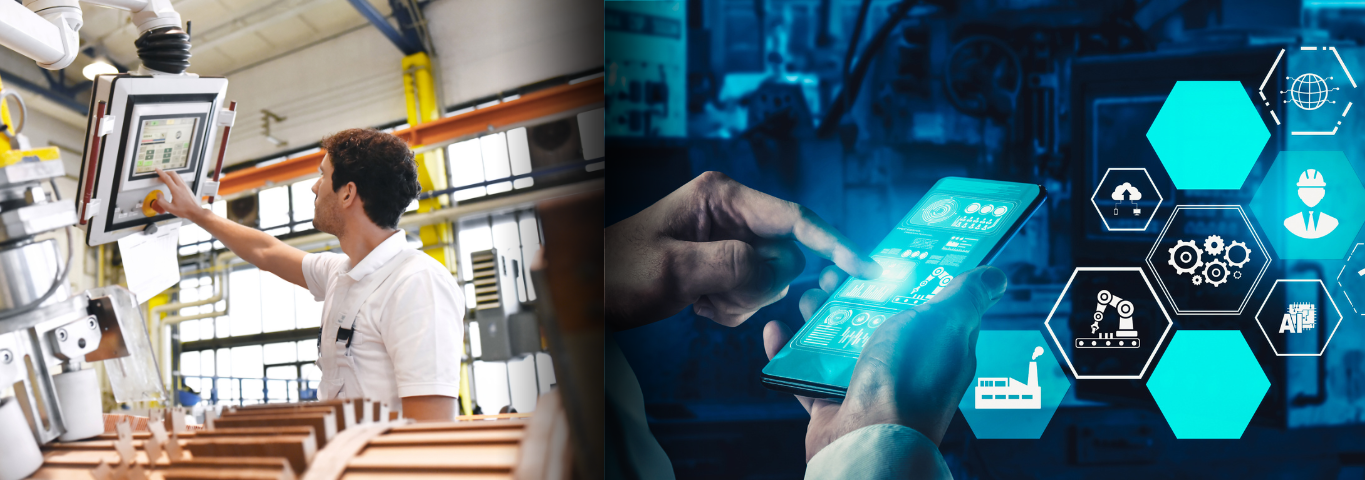In a world where the urgency to combat climate change is palpable, industries increasingly embrace innovation to mitigate their environmental footprint. Cleantech, a term coined to describe technologies that address environmental challenges, has emerged as a beacon of hope.
But what if we took it a step further? What if we adopted cleantech and integrated it seamlessly with cutting-edge technology to create a sustainable and efficient manufacturing environment? Welcome to the era of Tech-Enabled Cleantech and Smart Manufacturing.
At its core, this concept embodies the marriage of technology and sustainability. It's about leveraging advancements in artificial intelligence (AI), the Internet of Things (IoT), robotics, and data analytics to revolutionize traditional manufacturing processes. The goal? To reduce environmental impact, enhance productivity, streamline operations, and drive economic growth.
Smart Factories: The Heart of Tech-Enabled Cleantech
Imagine a manufacturing plant where every machine has sensors that monitor energy consumption, emissions, and performance in real-time. These data points are then analyzed using AI algorithms to identify inefficiencies and optimize resource usage. This not only reduces energy waste but also cuts down on operational costs, making businesses more competitive in the market. But the benefits extend beyond the factory floor.
Smart manufacturing enables predictive maintenance, where machines can flag potential issues before they escalate into costly breakdowns. This proactive approach minimizes downtime and extends the lifespan of equipment, reducing the need for frequent replacements and thus decreasing overall waste.
Moreover, companies can further reduce their carbon footprint by integrating renewable energy sources such as solar panels and wind turbines into intelligent factories. Pair this with energy storage solutions like advanced batteries, and suddenly, factories can operate partially or even entirely off the grid, reducing reliance on fossil fuels and contributing to a greener future.
Green Manufacturing: Beyond Individual Businesses
The impact of Tech-Enabled Cleantech goes beyond individual businesses; it permeates entire supply chains. Through blockchain technology, companies can track the sustainability credentials of raw materials from extraction to production, providing consumers with greater transparency and confidence in the products they purchase.
Furthermore, advancements in additive manufacturing, more commonly known as 3D printing, are revolutionizing the way products are made.
By precisely depositing materials layer by layer, 3D printing minimizes waste and allows for complex designs previously impossible with traditional manufacturing methods. This reduces material usage and opens up new possibilities for lightweight, resource-efficient products.
The numbers speak for themselves. According to a report by the International Energy Agency, implementing innovative manufacturing technologies could reduce global CO2 emissions by up to 5.6 gigatons by 2050. This represents a significant step towards achieving the targets set out in the Paris Agreement and averting the worst impacts of climate change.
However, realizing the full potential of Tech-Enabled Cleantech requires collaboration across industries, governments, and academia. Policies that incentivize investment in sustainable technologies, research funding for innovation, and public-private partnerships are essential to drive progress in this field.
What practical steps can be taken towards a sustainable future?
Continual technological advancements are anticipated to further transform manufacturing processes through innovative solutions. As we embark on this transformative journey, let us harness the power of innovation to drive positive change and create a greener, more innovative, and more resilient future for future generations.
- Integrating Cleantech into Smart Manufacturing
As industries continue to evolve, incorporating cleantech into innovative manufacturing processes becomes not just an option but a necessity. The fusion of technology and sustainability presents a unique opportunity to revolutionize traditional manufacturing methods, paving the way for a more efficient, environmentally friendly future.
By embracing this paradigm shift, businesses can reduce their carbon footprint, improve their bottom line, and contribute to global efforts to combat climate change.
-
Utilizing Data and IT Infrastructure
One key pillar of tech-enabled cleantech and smart manufacturing is using data and IT infrastructure to optimize production processes. Manufacturers can gain real-time insights into energy usage, emissions, and environmental factors by leveraging sensors, IoT devices, and advanced analytics.
This granular level of monitoring allows for precise adjustments to optimize efficiency and reduce waste, ultimately leading to cost savings and environmental benefits.
- Enhancing Safety and Productivity Through Automation
Automation is crucial in improving safety and productivity within manufacturing environments. Human workers can focus on more complex and value-added activities by assigning risky or repetitive tasks to robots. This improves workplace safety and increases overall productivity, driving competitiveness in the global market.
- Leveraging Digital Twins
Digital twins are another innovative technology that is reshaping the landscape of intelligent manufacturing. These virtual replicas of physical systems enable manufacturers to simulate and assess various scenarios in a risk-free environment.
Digital twins help minimize downtime, reduce costs, and improve efficiency by proactively identifying potential issues and optimizing processes.
- Adopting a Holistic Approach
Besides these technological advancements, integrating cleantech into smart manufacturing requires a holistic approach considering the entire product lifecycle.
From sourcing raw materials to end-of-life disposal, manufacturers must prioritize sustainability at every stage. This includes adopting eco-friendly materials, designing recyclable products, and implementing circular economy principles to minimize waste and maximize resource efficiency.
- Fostering Collaboration
Collaboration is critical to driving progress in tech-enabled cleantech and intelligent manufacturing. Governments, industry stakeholders, and academia must work together to develop supportive policies, invest in research and development, and foster knowledge sharing and innovation.
Only through collective action can we realize the full potential of these transformative technologies and create a more sustainable future for generations to come.
What are the practical tips for readers?
- Start with Energy Audits: Conduct thorough energy audits to identify areas for improvement in energy efficiency within your manufacturing processes. This can uncover opportunities for optimization and resource savings.
- Invest in Sensor Technology: Explore integrating sensor technology into your manufacturing equipment to monitor energy consumption, emissions, and performance in real-time. This data can inform decision-making and drive efficiency improvements.
- Implement Predictive Maintenance: Adopt predictive maintenance strategies to prevent costly downtime by identifying and addressing potential issues before they escalate. This proactive approach can extend the lifespan of equipment and reduce maintenance costs.
- Explore Renewable Energy Solutions: Consider integrating renewable energy sources such as solar panels and wind turbines into your manufacturing facilities to reduce reliance on fossil fuels and lower your carbon footprint.
- Embrace Additive Manufacturing: Explore the possibilities of additive manufacturing (3D printing) to reduce material waste and create complex, resource-efficient products. This technology offers new opportunities for design innovation and sustainability.
- Collaborate for Impact: Engage in collaborative partnerships with other businesses, government agencies, and academic institutions to drive progress in sustainable manufacturing practices. Sharing knowledge and resources can accelerate innovation and create positive change on a scale.
By implementing these practical tips, businesses can take meaningful steps towards building a tech-enabled cleantech and intelligent manufacturing environment, driving sustainability, efficiency, and competitiveness in the global marketplace.
Conclusion
In summary, the integration of technology and sustainability in cleantech and intelligent manufacturing offers a groundbreaking opportunity to improve industries. We can reduce waste, emissions, and energy consumption by leveraging innovations like AI, IoT, and additive manufacturing while boosting productivity and competitiveness.
Collaboration across sectors is essential to drive progress and unlock the full potential of these transformative technologies. We can create a greener, smarter, and more sustainable future for all.






Comments